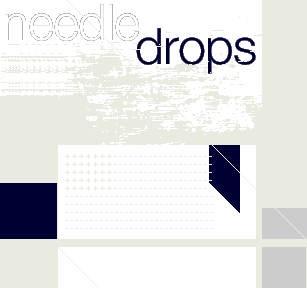


++ Contact Philip Sherburne ++
++ Recently ++
Tuesday, November 29, 2005 = The Stooges Unearthed (Again)
Tuesday, November 8, 2005 = Documenting Beulah And DCFC
Tuesday, November 1, 2005 = Out-Of-Control Rock 'N' Roll Is Alive And Well
Tuesday, October 25, 2005 = Just In Time For Halloween
Monday, October 3, 2005 = The Dandyesque Raunch Of Louis XI
Monday, August 15, 2005 = The Empire Blues
Tuesday, August 9, 2005 = David Howie's Sónar Diary
Monday, July 25, 2005 = Hot Sounds For Summertime
Monday, June 27, 2005 = Overcoming Writer's Block At Sónar 2005
Monday, June 4, 2005 = Cool New Sounds To Download Or Stream
++ Needle Drops Archives ++
View full list of Needle Drops articles...
|
|
 |
February 1, 2002
++ No, Electronic Music Wasn't The Soundtrack Of The Dot-Com Bubble
++ There are times I wish I weren't so committed to this thing called electronic music. Not because I don't love it, but because it draws me into battles I'd rather not have to fight. I felt this way a few years back when the New York Times critic Michiko Kakutani took techno to task for its "cold, distinctly antihumanistic agenda," and darkly implied that it was "in the process of making real, live musicians obsolete." Given that it was only 1997, and many American audiences had barely heard more than a few bars of drum loops at that point, I almost could have forgiven her fearful conservatism, were it not for sentences like: "There are more distressing aspects to the techno revolution, however, that underscore how far the rest of our culture has gone toward repudiating the basic tenets of humanism — namely, a belief in social responsibility, individualism and the uses of sympathy and the imagination."
Please. Had she been watching too many episodes of 2001: A Space Odyssey? Her accusations were more aptly suited to HAL than the shape of the scene at the time; the best she could do was to sneer that "[m]any practitioners don't even crave renown as artists — they pride themselves on their anonymity, their subservience to the digital muse," as though rejecting the star system were some dastardly blow against Western Enlightenment ideals. I can only hope that today Kakutani can look back on her assessments and realize that the real enemies of "social responsibility, individualism and the uses of sympathy and the imagination" are more likely to be found in the boardroom or the Oval Office than in the electronica aisle of your local music retailer.
I don't dredge this up to take pot-shots at Kakutani (though I will gleefully direct you to a gentle skewering courtesy of McSweeney's), but to show how electronic music often becomes merely a lens for the projection of another agenda. This week in Salon, a review of the Chemical Brothers' new album, Come With Us, by Michelle Goldberg (no relation to Neumu editor in chief Michael Goldberg) attempts to situate electronic music in the context of the dot-com hangover. "It's hard to imagine a worse time for the release of the Chemical Brothers' new record, 'Come With Us,' than this January," she writes:
"Along with bombastic peers Fatboy Slim, the Prodigy, Daft Punk and, most recently, Basement Jaxx, the Chemical Brothers graced the 1990s with some of the most cutting-edge office-party music the world has ever known. In 2002, though, there are far fewer cutting-edge offices, and those still toiling in them don't feel much like partying. On this, their fourth album, the English duo of Tom Rowlands and Ed Simons return to their euphoric hands-in-the-air techno roots after the pastoral psychedelic pop of their last record, 'Surrender.' It's excellently crafted, grandiose and rousing, and right now, it sounds ridiculous."
It's an interesting argument; I'm all in favor of tying music criticism to broader social analyses, as I made explicit last week. In fact, in this era of publicist-stroking puff pieces, I'm grateful for criticism that makes any argument whatsoever. But Goldberg's piece, unfortunately, shrinks the whole sprawling mass of electronic music to fit the narrow confines of her thesis, and in doing so, it misrepresents the nature of the phenomenon. (Because electronic music isn't even a genre per se; the term can encompass almost any- and everything we listen to these days, save for back-porch blues savored on an actual back porch. But that's another column.)
First of all, there's the matter of "office-party music," a genre neologism that's currently got the members of the 313 list scratching their collective suedehead. I think the way Goldberg uses the term is clear: the euphoric hedonism of the Chem Bros et al. (who, I would add, properly belong to the subgenre of big beat — a pop music genre that differs considerably from techno, per se) was reflective of the predominant mood of the dot-com economy. But the claim's a bit disingenuous. It's worth debating how far the dot-com mood actually reached: I worked for a startup that grew rapidly and enjoyed a massive "first-day pop" on the morning of its IPO, but I don't remember "Block Rockin' Beats" blasting over the intercom as we popped the champagne. Hell, at our one holiday party to coincide with the cash-flush days, we were serenaded by ska and surf bands. Perhaps our party planner was just really uncool, but I think it's worth asking how accurately one can link the existence of an entire mode of music-making with a particular industry or economic bubble. The advertisers may have turned to breakbeats to spice up commercials for online investing, but that's not to say that dance music existed solely in the service of E*Trade.
The crux of Goldberg's argument is that techno (which here is used as a metonym for electronic dance music in general) provided the soundtrack to the boom economy — "the ubiquitous backbeat of the frenetic years when corporations bought up the dregs of bohemia, cloaked themselves in street cred and went hurling heedlessly toward an imagined future of endless opportunity, progress, speed and money" — and now that the balloon has popped, techno is left grasping for relevance. She compares the late-'90s buzz around acts like Basement Jaxx and Daft Punk with this year's darlings, the White Stripes and The Strokes. But the numbers may not hold up under inspection: Basement Jaxx's Rooty, which appeared in June of 2001, has sold (according to SoundScan) 84,000 units so far — a disappointing number compared to Remedy's 148,000, sure, but still more than half again the 54,000 The White Stripes' White Blood Cells, released only a month later, has clocked so far.
It's also worth asking how long any "next big thing" can last in a short-attention-span culture. Is the "return of rock" a grand narrative of the zeitgeist, or simply a reflection of pop culture's fickleness? (On a two-step list I subscribe to, there's been much debate of late as to whether two-step's failure to take off in the U.S. is due to the mismatch between the music's feel-good tone and the pervasive glumness Stateside — to grandly inconclusive results. UK drum 'n' bass's turn to "darkside," for instance, has been attributed by Simon Reynolds to a collective overdose on the drug Ecstasy, suggesting that the boom years themselves carried the seeds of their own downfall.) Not that I want to be in the position of electronica apologist: I don't really care whether the music makes the Top 40 or not, and I take issue with Goldberg's statement that "artistically, mainstream producers are going to have to find a way to make their jubilant, triumphant dance music relevant in subdued, precarious times." I'm not quite sure how one measures pop music relevance, but a quick look at the current Billboard Top 10, locked down by acts like Creed, Linkin Park, Ludacris and NaS, doesn't suggest any grand stylistic appropriateness to the Year of Living Ponderously.
In some ways, Goldberg is spot on the money: savvier than many critics, she recognizes that dance music rocketed from underground origins to achieve major media presence, and that now that it's worn out its welcome, it's going to have to find somewhere to go. The industry's growing pains are real: the market is flooded with mediocre product, and sooner or later there will have to be a shakeout. Labels will fold, and people in the industry will lose jobs, and those publicists that remain will very likely rethink their goals of getting DJ so-and-so on the cover of Rolling Stone.
In the end, though, I take issue with Goldberg's assessment because it equates the fate of a single pop group with the whole of electronic music — a rhetorical move analogous to, say, pinning the success of Death Cab for Cutie, Fugazi and Chris Lee on the sales of Korn. Goldberg's inflation of the Chemical Brothers' significance ignores the autonomy of electronic music's many, many factions: the myriad strains of house, techno, breaks, drum 'n' bass, garage, etc. that make up dance music, and the countless versions of non-dance-oriented electronica. "[T]he culture at large desperately needs new currents to wash away the stale excesses of the '90s," she writes, and that "leaves the field wide open for innovation to bubble up and for people working outside genre boundaries to get a hearing."
But why does that have to happen outside genre boundaries? The history of dance music — which is really what she's talking about — is a story of genres. Indeed, the alleged failure of the Chemical Brothers might be read as what happens when you take dance music outside its natural habitat — not just the club, but the genre that nurtures a given artist — and replant it in the broader field of mass culture. Just because mainstream audiences have fallen out of love with dance beats doesn't mean that dance music is dead: indeed, it's thriving, in city after city, scene after scene, within genres and across stylistic boundaries. Innovation is bubbling up all around us, in a torrent that makes a mockery of electronica's brief champagne splash onto the charts back when Yahoo was trading in the hundreds.
As to whether or not the mainstream notices — well, that's up to them, isn't it?
|
| |
|